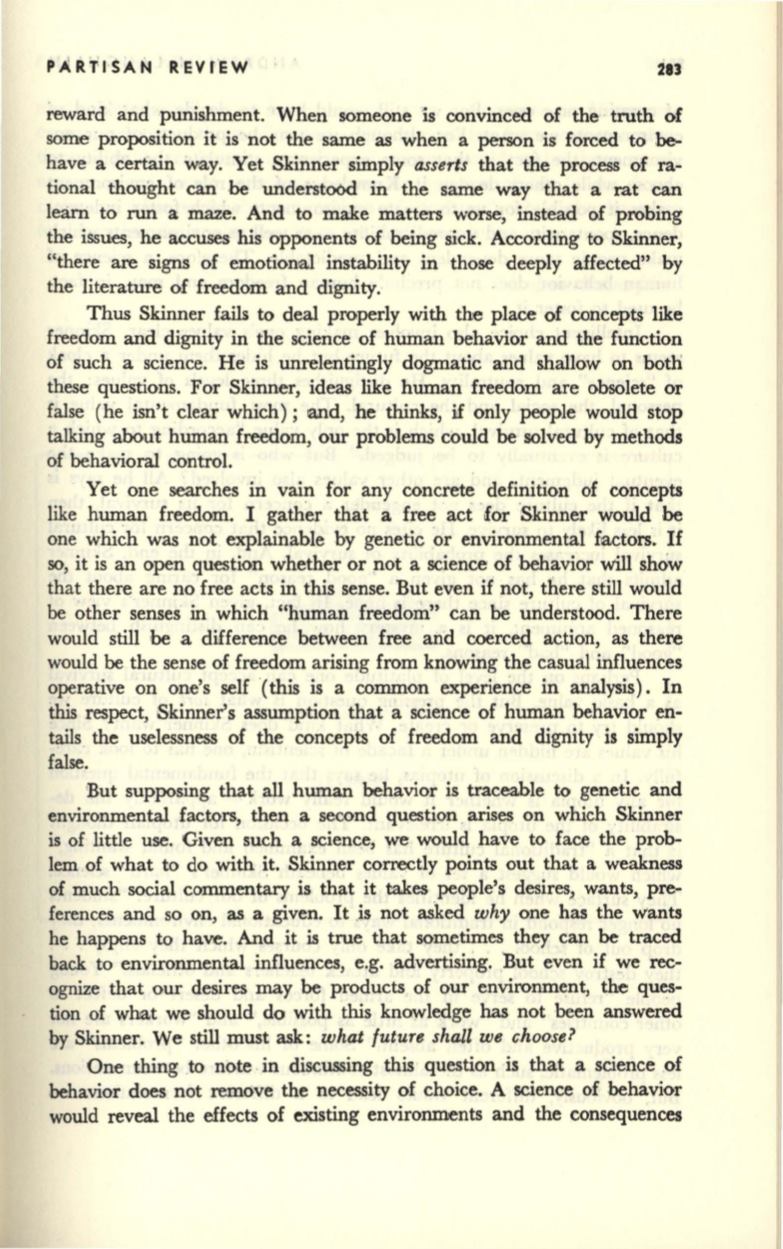
PARTISAN REVrEW
213
reward and punishment. When someone is convinced of the truth of
some proposition it is ·not the same as when a person is forced to
be–
have a certain way. Yet Skinner simply
asserts
that the process of ra–
tional thought can be understood in the same way that a rat can
learn to run a maze. And to make matters worse, instead of probing
the issues, he accuses his opponents of being sick. According to Skinner,
"there are signs of emotional instability in those deeply affected" by
the literature of freedom and dignity.
Thus Skinner fails to deal properly with the place of concepts like
freedom and dignity in the science of human behavior and the function
of such a science. He is unrelentingly dogmatic and shallow on
botll
these questions. For Skinner, ideas like human freedom are obsolete or
false (he isn't clear which); and, he thinks,
if
only people would stop
talking about human freedom, our problems could be solved by methods
of behavioral control.
Yet one searches in vain for any concrete definition of concepts
like human freedom. I gather that a free act ·iorSkinner would
be
one which was not explainable by genetic or environmental factors.
If
so, it is an open question whether or
pot
a science of behavior
will
show
that there are no free acts in this sense. But even
if
not, there still would
be
other senses in which "human freedom" can be understood. There
would still
be
a diiference between free and coerced action, as there
would be the sense of freedom arising from knowing the casual influences
operative on one's self (
this
is a common experience in analysis). In
this
respect, Skinner's assumption that a science of human behavior en–
tails. the uselessness of the concepts of freedom and dignity is simply
false.
But supposing that all human behavior is traceable
to
genetic and
environmental factors, then a second question arises on which Skinner
is of little use. Given such a science, we would have to face the prob–
lem of what to do with it. Skinner correctly points out that a weakness
of much social commentary is that it takes people's desires, wants, pre–
ferences and so on, as a given. It .is not asked
why
one has the wants
he happens to have. And it is true that sometimes they can be traced
back to environmental influences, e.g. advertising. But even if
~e
rec–
ognize that our desires may be products of our environment,
the
ques–
tion of what
we
should do with this knowledge
has
not been answered
by Skinner. We still must
ask:
what future shall we choose}
One thing to note in discussing this question
is
that a science of
behavior does not remove the necessity of choice. A science of behavior
would reveal the effects of existing environments and the consequences


